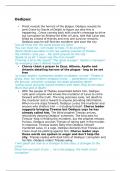Oedipus:
Priest reveals the horrors of the plague, Oedipus reveals he
sent Creon to Oracle of Delphi to figure out why this is
happening , Creon coming back with oracle’s message to drive
out corruption by finding the killer of Laius, told that Laius was
killed by a band of thieves and only one survivor remains,
Oedipus says he will find the murderer and save the city
‘you all know me, the world knows my fame’
‘You can trust me. I am ready to help, I’ll do anything.’
‘Black Death luxuriates in the raw wailing miseries of Thebes’
‘My children I pity you. .. My spirit grieves for the city’
‘Speak to us all’ ‘I never saw the man myself’
‘I’ll bring it all to life myself’ ‘The lands avenger’ ‘Apollo’s champion’
‘by avenging Laius I defend myself’
Chorus chant a prayer to Zeus, Athena, Apollo and
Artemis detailing horrors of the plague - beg to be set
free
‘so many deaths, numberless deaths on deaths, no end - Thebes is
dying, look, her children stripped of pity … generations strewn on
the ground, unburied, unswept, the dead spreading death’
‘young wives and gray haired mothers with them cling to the altars’
‘Burn that god of death’
With the people of Thebes assembled before him, Oedipus
calls upon anyone who knows the murderer of Laius to come
forward with the truth. The king promises exile, not death to
the murderer and a reward to anyone providing information.
When no one steps forward, Oedipus curses the murderer and
anyone who shelters him — including himself. Chorus leader
suggests bringing Tiresias but Oedipus says he has
already called him. The blind prophet Tiresias arrives,
reluctantly obeying Oedipus' summons. The king asks for
Tiresias' help in finding the murderer, but the prophet refuses.
Furious, Oedipus accuses Tiresias of taking part in the murder.
In response, Tiresias states flatly that Oedipus himself
murdered Laius. In a rage, Oedipus declares that Tiresias and
Creon must be plotting against him. Chorus leader says
these words are spoken in anger and don’t help the
city. Tiresias replies with dark hints of Oedipus' corruption and
his fate. Oedipus orders Tiresias away.
‘I will speak out now as a stranger to the story, a stranger to the
crime.’
Drive him out each of you … he is the plague, the heart of our
corruption’
, ‘I will fight for him as if he were my father’ ‘don’t hold back say it’
‘O. Tiresias master of all the mysteries of our life’ ‘We are in your
hands’
‘You you scum of the earth, you’d enrage a heart of stone!’
‘That obscenity, twice - by god you’ll pay.’
‘I pity you flinging at me the very insults each man here will fling at
you’
‘scheming quack, fortune teller peddling lies’ ‘I stopped the sphinx’
‘I am your equal: the right to reply. I claim that privilege too. I am
not your slave. I serve Apollo.’ ‘You’re blind to the corruption of your
life’
‘Wait who is my father?’ ‘This day will bring your birth and your
destruction. /Riddles all you can say are riddles … aren’t you the
best man alone at solving riddles?’
‘Blind who now has eyes, beggar who now is rich’
In this ode, the chorus wonders at the prophet's
accusation that Oedipus is the murderer of Laius. As
loyal subjects, they are horrified and confused. Still,
they will stand by their king unless the charges are
proved.
‘who is the man the voice of god denounces’
‘he cannot outrace the dread voices of Delphi’
‘I can’t accept him, can’t deny him, don’t know what to say/ I’m lost
and the wings of dark foreboding beating’
‘Never will I convict my king, never in my heart’
The scene opens with Creon's denial of plotting against
Oedipus when speaking to the Chorus Leader.When
Oedipus angrily repeats his charges, Creon again denies it,
arguing rationally that he has no motivation to usurp the
throne. Jocasta divides the men, sending Creon home. Oedipus
continues to complain of Creon's charge (through Tiresias) that
he himself killed Laius. Chorus try to remind Oedipus of
how Creon is sensible and loyal - he shouldn’t be exiled.
Jocasta asks chorus what caused this and they tell her
vague details. Oedipus gets angry at the chorus for
blunting his anger. When Jocasta hears that the charge
comes from a prophet, she dismisses it immediately. No one
can see the future, she insists. As proof, she offers the story of
a prophecy that her son would kill her husband, a fate avoided
when Laius abandoned the child on a mountain. After Oedipus
learns the details of Laius' death, he begins to worry that he is
indeed the murderer. Jocasta, however, reminds him that Laius
died at the hands of many men, not one. Nevertheless,
Oedipus asks that the only witness left to the murder a
shepherd — be brought to him for questioning. (Shift from a
detective story to psychological drama)




